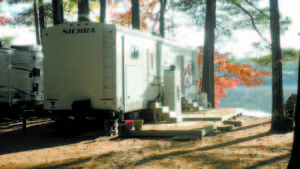Harrison seeking enforcement on campground decks

STEP RIGHT UP — It might seem insignificant, but the entrance platform to this camper and others on lakefront lots at Vacationland Campground in Harrison is considered an illegal structure under state Shoreland Zoning. The town of Harrison is currently negotiating a consent agreement with the campground’s owners to prohibit such decks, which seasonal campers say are necessary because of the safety risks posed by the uneven ground and exposed roots.
By Gail Geraghty
Staff Writer
Harrison Selectmen and Vacationland Campground are negotiating an agreement to correct a Shoreland Zoning violation that neither side was aware of — entrance decks to campers on lakefront lots.
Campground owner Gretchen Osgood met with the board last month and said she had no idea when she bought the 100-site campground in 2010 that the 11 decks, some simple platforms and others more elaborate, were illegal. She’s agreed to the removal of the larger decks and those that extend out over the water.
Selectmen want all of the violating decks removed within three years, but Osgood is asking for five years, saying anything less would be an economic hardship.
“People are threatening to leave,†said Osgood. “When I bought the campground, all of my waterfront sites had decks of their own, and some of them have been there for 30 years…there’s 11 of them, and that’s $44 grand out of my pocket†in terms of seasonal leases, she said.
Code Enforcement Officer John Wentworth, however, had misgivings about waiting too long to correct the violation.
“In essence, you’re allowing something that hasn’t been permitted to exist, that you don’t have the authority to do,†Wentworth told the board. Board member Richard St. John said three years would be a prudent time frame because all of the state codes, including Shoreland Zoning, plumbing and building codes, change on a three-year cycle.
Wentworth said the waterfront sites are grandfathered sites with regard to the campers, but not with regard to structures. “The problem is, there is no record of anybody permitting anything. So I can’t very well say they are grandfathered.â€
Osgood said when she bought the campground for $1 million, she was required by the bank to obtain a statement saying the campground was in compliance with Shoreland Zoning. The town provided such a statement, under a former code enforcement officer. After Wentworth came on, he started looking into the issue, which came to a head when an elaborate deck was built for one of the campers last year.
Osgood said, “I will comply with whatever I’m forced to do.†But she said she wished the board would consider allowing the decks already there to stay until such time as the owners of the campers leave the site or the lot is leased to someone else.
“I just think this is unreasonable — people are going to leave,†she said. It was pointed out that in neighboring Bridgton, selectmen there resolved the same issue with decks at the town-owned Salmon Point Campground by allowing the decks and any other illegal structures to be grandfathered until such time that the lot lease changes hands.
Osgood’s partner said, “The hardship on us is when people have spent $50,000 on a camper and were told they could have a deck — that’s their idea of camping.†He said one woman who camps there each season needs help walking, and “she could not have that site without a deck. She couldn’t walk. I mean, the roots are this tall.â€
Board Chairman Kathy Laplante said, “The board does not want to impede on your business,†which is the only campground on Crystal Lake.
Wentworth said one possible compromise would be to order that the decks be scaled back to no more than 4’x6’ in size and be removable at the end of each season. He said the enforcement order is complicated by the fact that the town will need to provide a breakdown of each affected lot, and the action to be taken at each lot.

